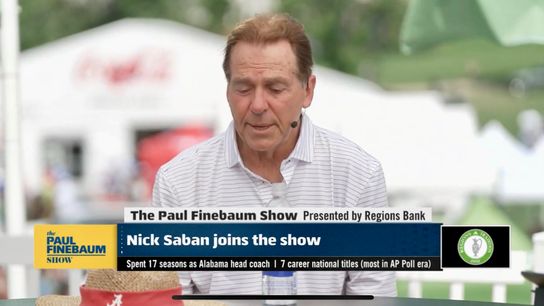Nick Saban revealed Wednesday that during President Donald Trump's recent appearance at the University of Alabama, where he devliered the commencement speech to the Tide's Class of 2025, that President Trump told him, "All my friends are saying college football's really messed up."
Saban pointed to the revelation of his conversation with President Trump as root cause of Saban now being identified, again, as the person perhaps best-positioned to guide change -- read, regulation -- into an all-new era of collegiate athletics and especially college football.
While saying he's happy to help in any way he can, the seven-time NCAA college football national championship-winning coach isn't seeking to be at the forefront of any such efforts, nor does he think it's requisite to form a special "College Commission," a notion that's circulating widely on the heels of the unofficial Saban-Trump Tuscaloosa Accord.
"Well, first of all I don't know a lot about the Commission. Secondly, I'm not sure we really need a commission," Saban says in his Wednesday appearance on Paul Finebaum's eponymous show. "I think that a lot of people know exactly what the issues are in college football and exactly what we need to do to fix them.
"I think the key to the drill is getting people together so that we can move it forward. I'm not opposed to players making money; I don't want anybody to think that. I just think the system, that the way it's going right now, it's not sustainable and probably not in the best interests of the student-athletes across the board or the game itself. I think we need to protect the brand and the competitive advantages and disadvantages that are being created right now, and I think we can fix all of that. I think we know how to do it -- not just me, but a lot of people. We've just got to get everybody together to do it."
Well, I think first of all, the way all of this started was when President Trump spoke at commencement at Alabama, he said, 'All my friends are saying college football's really messed up. Let's get together so I can figure out or we can figure out how to fix it.' So, that's how all this got started."
If Saban has what he believes are the answers to regulate a system that's essentially without any guardrails and no longer even being whispered as "pay-for-play," particularly in college football and basketball, among other sports, he's not sharing those details.
Not publicly and not beyond saying there needs to be involvement from the federal government, as well as "Interstate Commerce" regulations to help provide so common ground among the 50 states.
"I really don't want to get into the implementation of what I would do," Saban says. "I think the first thing is, everybody's got a different state law which creates advantages and disadvantages and everybody's trying to create advantages. We probably need an Interstate Commerce-type something that gets it all there. I don't think it's in the best interests of the players to necessarily be employees. And I think authentic name, image and likeness is good for players, but I don't think pay-for-play is necessarily what we want. What is college? We all went to college to create value for our future, and I think we want to keep some semblance of that in terms of guys becoming and developing as people and students and a career off the field as well as developing the ability to play at the next level.
"So, we've gotta have a system that enhances all three of those."
Despite sounding the alarm of what he deems an unsustainable system, Saban does believe college athletics -- specifically, college football -- is not so far gone that it's beyond repair.
"Yeah, I think so. I just think we've gotta have some people get together and push it forward," he says. "I think there's a lot of people out there that know how to fix it; I just think we've got to push it forward and get everybody together and some of it may need to be done on the Federal level. That's where we're going to have to get people together.
"I don't think I should be at the tip. I think I'm someone who has experience and certainly would like to help anyone who would seek our help to try to help fix it, because I spent my whole life, 50 years, trying to help players be more successful in life, and I want us to continue to be able to do that. Not just in football, but in all sports across the board. I mean, we've got to protect big sports, whether they produce revenue or not, because it's opportunities for young people to get an education, it trains a lot of people for the Olympics, and so there's a lot of things about college football that I think is worth trying to make sure we keep the integrity of those things intact so that people can continue to have opportunities and be successful."
